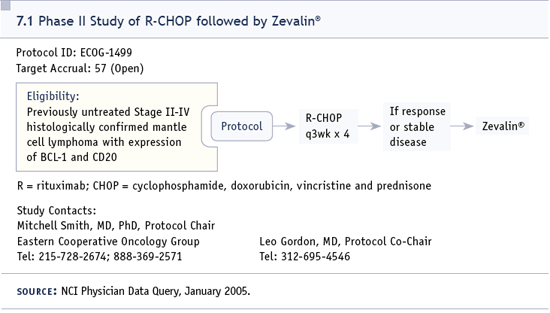You are here: Home: Meet The Professors Vol. 3 Issue 1 2005: Case 7

Edited excerpt from the discussion:

DR LEONARD: The bottom line with mantle cell lymphoma is that R-CHOP is not enough as far as up-front therapy. I would consider clinical trials of hyperfractionated cyclophosphamide, vincristine, doxorubicin, and dexamethasone (hyper-CVAD) with rituximab with or without a transplant, or R-CHOP with a transplant, unless the patient is not a candidate.
You have chosen the hyper-CVAD/rituximab path, which is reasonable and appropriate. The questions are: Do you pursue a full course of rituximab/hyper-CVAD and stop?
Do you pursue a full course of hyper-CVAD and an autologous transplant, an abbreviated course of hyper-CVAD and an autologous transplant, or either of those with an allogenic transplant or perhaps a miniallogenic transplant?
No randomized trials exist to guide us. The MD Anderson data suggest that hyper-CVAD with an autologous transplant is similar to rituximab/hyper-CVAD without an autologous transplant, so a question arises over whether you need to do an autologous transplant if you’re going to give the full course of R-hyper-CVAD.
Another question would be: Do you just stop the R-hyper-CVAD and go to an autologous transplant? To some degree, it’s six of one, half a dozen of another. Knowing the problems that she’s had with the hyper- CVAD, I probably would not push ahead with that treatment at this point.
There is no guarantee that she’s going to continue to have these problems, but on the other hand, they may continue. Realistically, the difference is three or four months of treatment versus doing an autologous transplant, which involves spending a month in the hospital.
I would be inclined to do the autologous transplant. I think she’s demonstrated that she’s got chemotherapy-sensitive disease.
She’s a young patient with a rapid CR and chemotherapy-sensitive disease. My inclination is that chemotherapy-sensitive patients benefit the most from autologous transplant.
The question of an allogenic transplant is always an issue. Do you do that now? Do you do that down the line if she has a relapse after her autologous transplant? No data exist but I would lean toward stopping the hyper-CVAD, doing the autologous transplant, and hoping for the best. Probably five reasonable pathways could be followed, and it will be a complicated discussion with the patient. Given that her experience with hyper-CVAD hasn’t been a picnic, how will she feel about a transplant?
DR SMITH: I want to throw in an advertisement for the ECOG E-1499 trial, which is a Phase II trial of R-CHOP for four cycles followed by ibritumomab tiuxetan (Zevalin®) (7.1). I agree that R-CHOP is not adequate in this situation; it gives you about an 18- month duration of remission; however, RCHOP plus something — whether it is transplant or Zevalin — is a reasonable research question that should be evaluated on a research study, not off study.
As John mentioned, rituximab/hyper-CVAD probably equals hyper-CVAD followed by autologous transplant. At this point, I would agree it’s a question of balancing. What’s the risk of her having a complication from the methotrexate/cytarabine cycle versus complication from an autologous transplant? Again, that is a gut decision.

DR KAPLAN: What’s the role of bortezomib in this group of patients?
DR SMITH: Evidence indicates that it’s active in relapse disease. Certainly, when you have an active drug, one immediately thinks, “Well, I didn’t cure the patient with R-CHOP, maybe I should give maintenance or give rituximab/bortezomib/CHOP.” One could consider a lot of things, but no real data exist.
Some other interesting drugs are being investigated for use in mantle cell lymphoma. The rapamycin analog, CCI-779, has been evaluated in a couple of clinical trials. Tom Witzig did a Phase II study that showed significant activity. Some new drugs that are not typical lymphoma drugs also look interesting for treatment of mantle cell lymphoma; however, you still have the complicating factors — which combinations and when to use them, etcetera. If R-CHOP were not adequate, would you be willing to use a brand new agent up front or in combination with R-CHOP?
These are the issues we address in group discussions regarding what trial to propose next. Most of us believe that a national trial with rituximab/hyper-CVAD is not going to accrue well because even young, healthy patients have trouble tolerating that regimen.
DR LOVE: What do you think you’re going to do, Len?
DR L FARBER: She’s being harvested tomorrow.
Select publications
|
